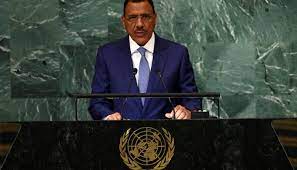
The Minister of Communications, Innovation and Digital Economy, Bosun Tijani, has firmly stated that the Federal Government will not approve a 100 percent tariff increase demanded by telecom companies. While acknowledging that an increase in telecom tariffs is necessary due to rising operational costs, inflation, and the devaluation of the naira, Tijani emphasized that such a steep rise would be detrimental to Nigerians.
Speaking during a televised interview on Wednesday, Tijani made it clear that while the telecoms sector has been asking for a significant tariff hike, the government would not approve the full 100 percent increase. He suggested that a more reasonable increase would range between 30 to 60 percent.
“These companies are asking for 100 percent, stating clearly that this is what they believe they need to stabilize the sector. However, if this sector is crucial to driving growth in our country, a 100 percent hike would be harmful to the people,” Tijani explained.
The Minister also mentioned that the Nigerian Communications Commission (NCC) is still reviewing the request and has not finalized a specific figure. The government intends to carefully consider the implications of any increase, balancing the needs of the telecoms industry with the impact on Nigerian consumers.
Tijani’s comments came after MTN Nigeria’s CEO, Karl Toriola, had previously stated that telecom companies are unified in seeking a 100 percent tariff increase. Toriola explained that the sector is facing similar challenges to others, including inflation and currency devaluation, which have led to rising operational costs. He also pointed out that other sectors, such as aviation and power, have already raised their tariffs, leaving telecoms as one of the few industries not adjusting prices.
“We at MTN believe we need an adjustment of about 100 percent,” Toriola said in an interview earlier in January. “The industry is aligned because we are all experiencing the same challenges. The government is sensitive to the financial pressures on consumers, but we are optimistic that we will get something substantial, maybe through smaller, progressive adjustments over the course of the year.”
Despite these concerns from telecom companies, Tijani reiterated that the government’s priority remains protecting consumers from undue financial strain while ensuring the sustainability of the telecom sector. He noted that for mobile network operators to enhance service quality, continuous investment in infrastructure and equipment would be necessary.
The government is continuing its deliberations, with the final decision on tariff adjustments expected to balance the needs of the telecoms industry with the broader economic realities facing the country.





